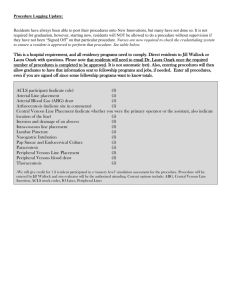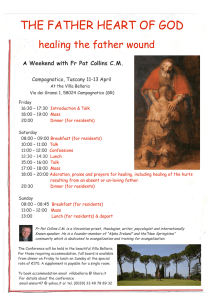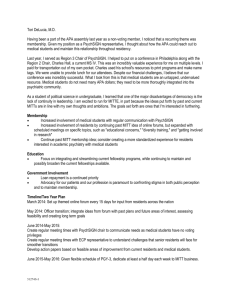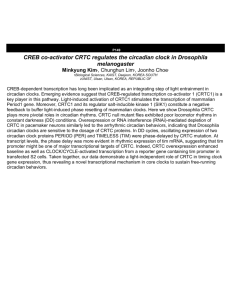Word 2007 - Lubbock County Court Residential Treatment Center
advertisement
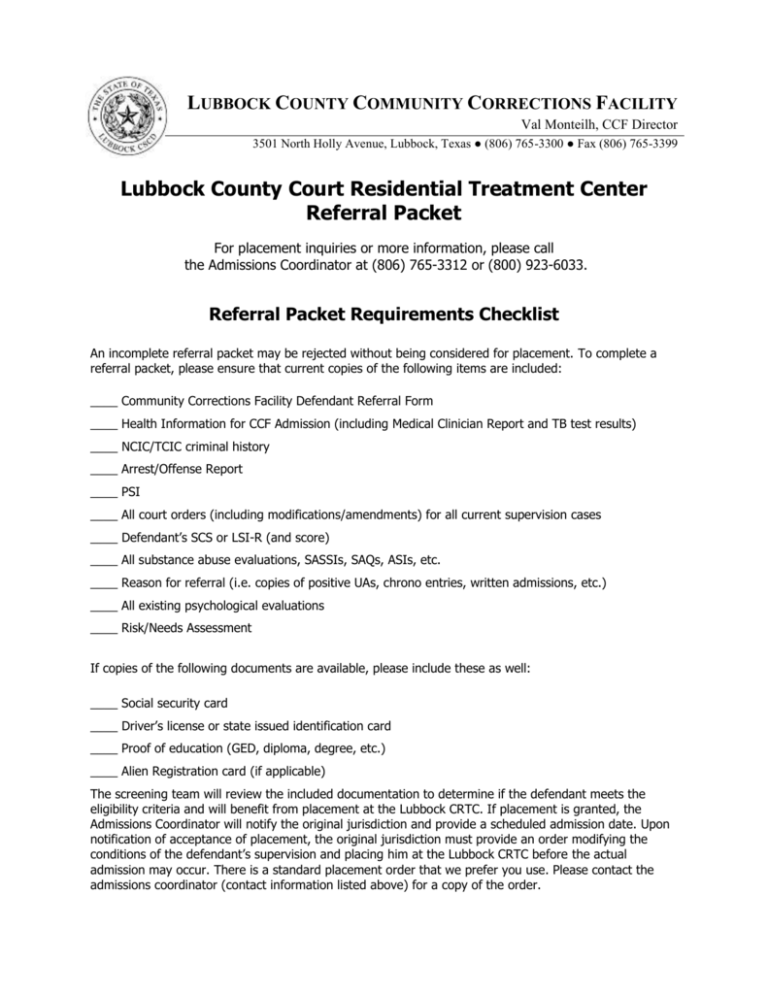
LUBBOCK COUNTY COMMUNITY CORRECTIONS FACILITY Val Monteilh, CCF Director 3501 North Holly Avenue, Lubbock, Texas ● (806) 765-3300 ● Fax (806) 765-3399 Lubbock County Court Residential Treatment Center Referral Packet For placement inquiries or more information, please call the Admissions Coordinator at (806) 765-3312 or (800) 923-6033. Referral Packet Requirements Checklist An incomplete referral packet may be rejected without being considered for placement. To complete a referral packet, please ensure that current copies of the following items are included: ____ Community Corrections Facility Defendant Referral Form ____ Health Information for CCF Admission (including Medical Clinician Report and TB test results) ____ NCIC/TCIC criminal history ____ Arrest/Offense Report ____ PSI ____ All court orders (including modifications/amendments) for all current supervision cases ____ Defendant’s SCS or LSI-R (and score) ____ All substance abuse evaluations, SASSIs, SAQs, ASIs, etc. ____ Reason for referral (i.e. copies of positive UAs, chrono entries, written admissions, etc.) ____ All existing psychological evaluations ____ Risk/Needs Assessment If copies of the following documents are available, please include these as well: ____ Social security card ____ Driver’s license or state issued identification card ____ Proof of education (GED, diploma, degree, etc.) ____ Alien Registration card (if applicable) The screening team will review the included documentation to determine if the defendant meets the eligibility criteria and will benefit from placement at the Lubbock CRTC. If placement is granted, the Admissions Coordinator will notify the original jurisdiction and provide a scheduled admission date. Upon notification of acceptance of placement, the original jurisdiction must provide an order modifying the conditions of the defendant’s supervision and placing him at the Lubbock CRTC before the actual admission may occur. There is a standard placement order that we prefer you use. Please contact the admissions coordinator (contact information listed above) for a copy of the order. Treatment Services Cognitive Behavioral Programming Criminal Conduct and Substance Abuse Treatment Responsivity Groups (Anger Management, Relationships, Mental Health, etc.) Social Skills & Problem Solving Commitment to Change Relapse Prevention Prosocial Skills Individual Counseling Addiction Education Community Service Restitution (CSR) Employability Skills Finances and Budgeting G.E.D./A.B.E. Program Health Education Leisure/Recreational Activities Meeting terms and conditions of Community Supervision (Alcohol Offender Program, Repeat Offender Program, Drug Offender Education Program, Personal Development Seminar courses, etc.) Chemical Dependency (CD) CD is a structured 39-week, cognitive-behavioral (CB) treatment program designed to address substance use and criminal thinking. Each of the seven phases is intended to target the resident’s thoughts, attitudes, and beliefs that can lead to negative behaviors, as well as the development and implementation of effective coping skills. Residents participate in individual and group counseling, educational and treatment classes, CSR, and employment. Dual Diagnosis (DD) DD is a structured 39-week, cognitive-behavioral treatment program designed to address substance use and criminal thinking for residents with mental health issues. This can include mental illness or impairment, such as Major Depression, Bipolar Disorder, ADD/ADHD, Schizophrenia, or lower cognitive functioning. Residents must be psychiatrically stable and capable of participating and completing the program. Potential residents need to have an I.Q. of 70 or greater in order to effectively complete the CB program. DD is structured similarly to the CD program, but in addition to addressing thoughts, attitudes, beliefs, and negative behaviors, residents are instructed on how to increase and apply effective coping skills, as well as appropriate management of their mental health concerns. Participation in the employment component of the program is determined on a case-by-case basis. Specialized Placement (SP) SP is designed to focus on high-risk offenders. It is a specialized track of the CD program. Residents follow the CD schedule, with additional classes to meet their needs. The program criteria includes, but is not limited to a score of LS or CC on the SCS, a history of extensive substance use or criminal behavior, and/or multiple or recurrent behavioral problems while at the Facility. Relapse Track Relapse is a four to six month track of the CD program intended to be an additional sentencing alternative for CSCDs. Relapse is for residents who have exited the Facility successfully, but are now violating their conditions of probation. The Relapse track focuses on skills and tools to help prevent further relapse or recidivism. Residents are assessed on an individual basis on their appropriateness for the program. Admission Criteria Offenders must be males, 17 and older Offenders must be experiencing drug and/or alcohol use problems. Offenders must be court-ordered to the facility as a condition of felony or misdemeanor community supervision. Offenders must be able to cognitively, physically, and emotionally participate in all program components. Offenders who have committed a Title 5 offense, have used a weapon during the commission of their offense, or have caused serious bodily harm or death of another may be eligible for admission, but they will be screened for suitability to the Facility on a case-by-case basis. Facility residents are able to participate in various activities throughout their stay. Treatment curriculum is offered Monday through Friday, including counseling, classes, recreation, among others. South Plains College provides G.E.D./A.B.E. instruction, as well as classes on lifeskills. All residents participate in CSR throughout the community, including charitable and community sponsored events. Weekends are utilized for free time, in-house visitation, and program incentive passes (furloughs). The Facility offers multiple recreation areas, including a weight room, computer lab, library, court yard, and a big yard designed for baseball, softball, walking, or running. Privileges are earned as residents progress through the program. Many privileges are earned upon completion of the Orientation phase, approximately three weeks after intake, including wearing street clothes, commissary, and use of the computer lab. In-house visitation and phone privileges begin in the third phase, roughly seven weeks after arrival. Furloughs are earned starting in the fourth phase, approximately 12 to 14 weeks into the program. They range in length from four to forty-eight hours, based on phase. Residents are allowed to have specified property while at the Facility. This includes shirts, shorts, pants, shoes, towels, hygiene, and a personal radio/cd player. A complete list of authorized property is available in the intake packet and from the Admissions Coordinator. The Lubbock County Community Corrections Facility/Court Residential Treatment Center (CRTC) opened its doors in March 1993, offering residential substance abuse & dependency services to adult males on community supervision. Currently the CRTC facilitates four diverse treatment programs with the ability to house 164 offenders. The goals of the CRTC are to prevent relapse, prevent recidivism, and to promote living a meaningful and responsible life, through treatment for criminal conduct and substance use. The CRTC offers education on criminal conduct, substance use, prosocial behaviors, and coping skills. The core curriculum of the Facility is Wanberg & Milkman’s “Criminal Conduct & Substance Abuse Treatment,” a cognitive-behavioral program that focuses on education and coping skills for both substance use and criminal thinking. The Facility offers up to 30 different classes and groups to provide individualized treatment for each resident. Through this education and guidance, the CRTC promotes a crime-free life of recovery. The Facility offers on-site counselors, Residential Community Supervision Officers (RCSO), medical staff, South Plains College staff, and security staff. Every staff member is certified in CPR and Cognitive Reflective Communication, and staff is provided with training relevant to the needs of the Facility and population. Property Items Allowed At Intake Number Allowed 2 24 2 12 bars or 4 bottles 2 4 1 1 3 2 bottles 5 1 1 pair 1 box 1 1 1 bottle 1 1 set 5 pair 6 1 Item Bath towels (white only) Batteries Belts Body soap or body wash Cap/Beanie CDs (no burned CDs) Clean & Clear facial cleanser Coat or jacket Conditioner Contact solution Deodorant Detergent (liquid & non-bleach) Eye glasses Fabric Softener Sheets Fingernail clippers without file Foot or body powder Lotion Mouthwash (alcohol free) Pajamas Pants2 Plastic hangers Radio or CD player (not MP3 or iPod) Razors (disposable) Razors (Gillette Fusion with blades) Religious book Number Allowed 2 packs 2 1 Ring Shampoo Shaving cream Shirts1 (color – long or short sleeve) Shoes (includes boots and sneakers) Shorts2 Socks Stamped envelopes Sunglasses Sweatshirt and sweatpants set T-shirts (white)1 Toothbrush Toothpaste Treatment books3 Tweezers Underwear Wash cloths (white only) Weightlifting gloves Wristwatch 1 3 2 5 3 pair 2 pair 6 pair 20 1 pair 1 6 5 5 2 1 6 2 1 pair 1 Item 1 Shirts must have sleeves. Tank tops, muscle shirts, etc. are not allowed. Pants and shorts may not be cutoffs or have holes. 3 Treatment books are self-help type books. 2 Contraband (Items Not Allowed) Aerosol products of any kind Alcohol and any product containing alcohol Altered or unauthorized clothing Altered or unauthorized property Audio tapes Bandanas Baseball cards Body/shower sponges or brushes Box cutters Cameras Cell Phones Chemical Weapons Cologne Computer devices Debit, Credit, and Phone Cards Dice Drug look-alikes Drug paraphernalia Drugs Earrings Electric/battery operated toothbrushes Electrical devices needing a cord Extension cords/multi plug receptacles Gambling paraphernalia Gel Pens Glue Gum Guns Hair clippers Headbands Heaters Keys (other than approved work keys) Knives Lamps Laser Pointer Lighters Lotto and scratch off tickets Mace Magazines unless given for an assignment Matches Medication not approved Mind-altering chemicals Nail clippers (with file) Nightlights Non-approved electronic equipment Non-approved Jewelry Pagers Pepper Spray Personal bedding Personal DVDs Personal fans Personal VHSs Personally acquired newspapers Photos (inappropriate content) Pornographic materials Razor blades Removable teeth grills Scissors Sewing materials Sharp Objects Stickers Studs or rings for any type of piercing Tattoo paraphernalia Tobacco products Tools Toxic markers or highlighters Whiteout



